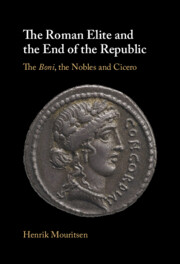Book contents
- The Roman Elite and the End of the Republic
- The Roman Elite and the End of the Republic
- Copyright page
- Contents
- Acknowledgements
- Introduction
- Part I The Boni in the Late Republic
- Chapter 1 Lost in Translation
- Chapter 2 Boni et Locupletes
- Chapter 3 Who Were the Boni?
- Chapter 4 Boni and Equites in the Late Republic
- Chapter 5 The Boni in Roman Politics and Public Life
- Part II Property and Politics
- Part III The Boni and the End of the Republic
- Appendices
- Bibliography
- Index
Chapter 3 - Who Were the Boni?
from Part I - The Boni in the Late Republic
Published online by Cambridge University Press: 15 December 2022
- The Roman Elite and the End of the Republic
- The Roman Elite and the End of the Republic
- Copyright page
- Contents
- Acknowledgements
- Introduction
- Part I The Boni in the Late Republic
- Chapter 1 Lost in Translation
- Chapter 2 Boni et Locupletes
- Chapter 3 Who Were the Boni?
- Chapter 4 Boni and Equites in the Late Republic
- Chapter 5 The Boni in Roman Politics and Public Life
- Part II Property and Politics
- Part III The Boni and the End of the Republic
- Appendices
- Bibliography
- Index
Summary
The elite in the Roman world was defined largely by financial criteria. It therefore comes as no surprise that ‘boni’ could be employed generically to describe the upper classes that held power by virtue of their superior wealth and resources. In this sense it was not confined to Roman contexts (let alone to its domestic politics) but could, as a purely social descriptor, be applied to the elites of any community past and present, whether in Italy, the provinces or further beyond. Already the elder Cato had described the local magistrates in Bruttium as boni, and in a letter from 46, Cicero asked M. Brutus to lend his patronage to the Arpinates, assuring him it would secure the support of the local boni viri.1 Later Cornelius Nepos referred to the leading men of Sparta as ‘viros bonos nobilesque’, implying it was a standard term for the elite of any society without specific connotations to the Roman republic, Them. 7.2. He also stated that the Athenian volunteer forces of Thrasybulus grew less than expected, ‘for even in those days the boni were readier to speak for liberty than to fight for it’.2
- Type
- Chapter
- Information
- The Roman Elite and the End of the RepublicThe <i>Boni</i>, the Nobles and Cicero, pp. 35 - 57Publisher: Cambridge University PressPrint publication year: 2022

